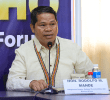“How does any group take responsibility where so many were unintentionally injured? It is time to wage peace,” says Jesuit Fr. Joel Tabora, President of the Ateneo de Davao University in reaction to this attack.
By ALEX D. LOPEZ
Davao Today
DAVAO CITY, Philippines – The recent incident in Paquibato District where a grenade lobbed by the New People’s Army (NPA) at a military detachment bounced off and exploded near a gymnasium wounding people gathered for a circus show, drew mixed reactions, putting on anew the call to wage peace.
“How does any group take responsibility where so many were unintentionally injured? It is time to wage peace,” says Jesuit Fr. Joel Tabora, President of the Ateneo de Davao University in reaction to this attack.
Peace talks between the government and the National Democratic Front (NDF) have been stalled for more than a year now after it resumed on February last year owing to claims by both sides on reneged deals.
While the NDF cry foul over the arrest of their personnel who are supposed to be guaranteed by safety and immunity agreements, the government on the other hand refuses to release the arrested personnel citing failure in verifying the individuals covered by the agreement as a reason.
Meanwhile, fighting on the ground continues and as fierce as the picture that war breeds, are the barbs one camp trade with the other.
The NPA on September 6 issued a statement of “self-criticism” on the incident and apologized to the public and families, vowing to take “concrete measures” to indemnify the victims.
It also declared that it is currently initiating an internal investigation and will take appropriate courses of action, “including disciplinary action” on the responsible unit.
But government authorities are saying that the NPA must “surrender their responsible unit” for prosecution in court.
“Dapat i-surrender nila, ihatud nila sa hustisya, (They have to surrender [their men], to bring about justice,)” Philippine Army 10th Infantry Division spokesperson Col. Lyndon Paniza said.
“I-give up nila tong naglabay sa granada ug ang iyahang mga kauban because it’s already a police matter and it’s a crime so they have to give up kadtong mga tawhana to so that the police can file appropriate charges sa ilaha and they answer the charges in court (They must give-up the person responsible for the grenade -hrowing, including his/her companions because it is already a police matter and it’s a crime so that the police can file appropriate charges and they can also answer the charges in court),” Davao City Mayor Sara Duterte said on Monday’s press briefing.
The NPA has responded to these calls, saying it is “illusory” and “idiotic,” and that the “government and the AFP have no right to presume or demand the revolutionary forces to recognize, work under and lay prostate before” their legal system.
It made it clear that it has its own justice system, under its People’s Democratic Government “that exercises and dispenses revolutionary justice in determining the consequences” of the unit responsible for carrying out the September 1 attack.
The September 1 incident also highlights the issue on military encampment in civilian communities.
Amid calls to pull out military encampments situated in population centers in the light of the Paquibato incident, Vice-Mayor Rodrigo Duterte refuted the military’s statement that their presence in the communities is needed “to keep the law and order.” Duterte pointed out that the “the issue here is rebellion.”
Peace advocates such as Sowing the Seeds of Peace have reiterated that the roots of armed conflict should be addressed through sustaining the peace negotiations to end the armed conflict. (with reports from John Rizle L. Saligumba/davaotoday.com)










